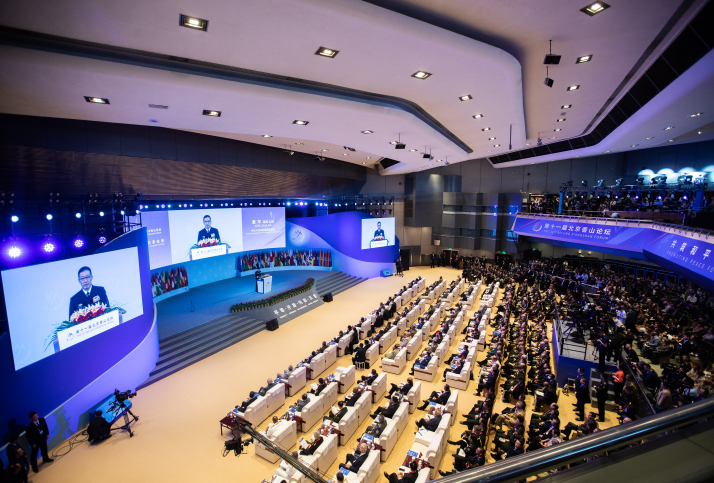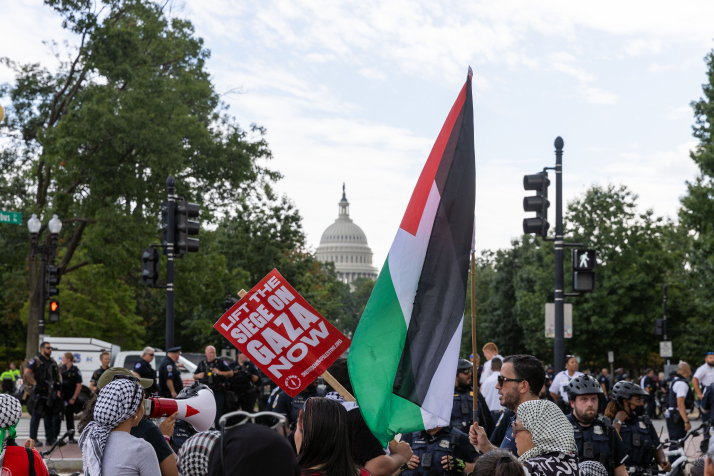| World |
| Beijing forum accumulates momentum for global security | |
|
|
 The 11th Beijing Xiangshan Forum underway at the Beijing International Convention Center on September 13 (XINHUA)
At the 11th Beijing Xiangshan Forum running from September 12 to 14, He Lei, former Vice President of the Academy of Military Sciences of the People's Liberation Army (PLA), had an informal conversation with U.S. Deputy Assistant Secretary of Defense Michael Chase, who led the U.S. Department of Defense delegation to the forum, reflecting the recent momentum in China-U.S. military interactions. He presented Chase with a badge from the PLA Academy of Military Sciences, featuring images of the Great Wall and an olive branch. "The Great Wall symbolizes defense, signifying that China adheres to a national defense policy that is defensive in nature and will not invade any country," He explained. "The olive branch, of course, represents peace." The conversation between He and Chase exemplifies the mission of the Beijing Xiangshan Forum. "From my observations, this forum plays a crucial role in fostering dialogue, which is fundamental for building understanding and mutual trust. Dialogue and mutual understanding are, I believe, the essence of peace," I Gusti Agung Wesaka Puja, Executive Director of the ASEAN Institute for Peace and Reconciliation, a research and advisory body under the Association of Southeast Asian Nations (ASEAN), and former Permanent Representative of Indonesia to the UN, told newspaper Global Times. "From what I observed, the communication at this forum has been very positive, creating a vibrant and creative atmosphere. Discussions are very open, which is central to ensuring that no one aspect is overlooked," he said. Initiated in 2006, the Beijing Xiangshan Forum is an annual high-level security and defense forum. This year's edition, themed Promoting Peace for a Shared Future, attracted over 1,800 participants, including official representatives from more than 100 countries and international organizations, alongside experts, scholars, and observers. The event provided a positive environment for discussing common security challenges. Voices from the Global South—regions of the world generally characterized by lower levels of economic and industrial development and often located south of more industrialized nations—on security issues have also been amplified, with over 60 percent of the representatives hailing from developing countries. Chinese President Xi Jinping sent a congratulatory letter to the forum, encouraging participants to build consensus and deepen mutual trust in the spirit of equality, openness, inclusiveness and mutual learning. Doing so can contribute to collectively addressing global security challenges and building a community with a shared future for humanity, Xi said. Necessary cooperation Countries should join forces to promote peace and stability in a time of global change, Chinese Defense Minister Dong Jun said in his keynote speech at the opening ceremony. He called on the international community to show mutual respect, engage with sincerity and seek common ground while reserving differences. Echoing Dong's sentiments, Vietnamese Defense Minister Phan Van Giang cited a Chinese proverb during the forum's first plenary session: "A single thread cannot make a cord, and a single tree does not make a forest." Giang called for greater security cooperation among countries, especially in non-conventional areas such as counterterrorism, transnational crime and cybersecurity. "These are significant challenges for all countries, regions and the world, requiring good-faith cooperation to address them together," he noted. The forum also included discussions on the China-proposed Global Security Initiative (GSI), introduced in April 2022. The GSI calls on countries to stay committed to the vision of common, comprehensive, cooperative and sustainable security, and work together to keep the world safe and secure.  Demonstrators gather in protest against Israeli Prime Minister Benjamin Netanyahu outside Union Station near the U.S. Capitol in Washington, D.C., the United States, on July 24 (XINHUA) Hot issues The forum also facilitated discussions on current key global security concerns. "To resolve hot issues such as the crisis in Ukraine and the Israeli-Palestinian conflict, promoting peace and negotiation is the only viable solution," Dong said. Chinese Vice Foreign Minister Chen Xiaodong said, "Regarding the Ukraine crisis, China will continue in-depth communication with all parties concerned to build consensus for ending the conflict and pave the way for peace talks." On the Palestine-Israel conflict, he stressed that China will continue to push for an early ceasefire and enhanced humanitarian assistance, support stronger national unity of Palestine and support Palestine's full membership in the UN, and call for a more broad-based, more authoritative and more effective international peace conference to work out a timetable and road map for implementing the two-state solution. The two-state solution calls for the creation of a Palestinian state living in peace with Israel with East Jerusalem being its capital. Zhang Weiwei, Director of the China Institute at Fudan University in Shanghai, who attended a parallel session, noted the rarity of seeing representatives from Russia, Ukraine and NATO sitting together to engage in dialogue. He emphasized the importance of the forum in bringing influential Russian scholars and former high-ranking Ukrainian officials to the same venue for dialogue. Russian Deputy Defense Minister Alexander Fomin said the forum has consistently provided a platform for representatives from national defense departments of participating countries to exchange views on pressing international security issues in an unbiased and constructive atmosphere, while also exploring budding avenues for military cooperation. Risk management China-U.S. relations have been a key topic in many international discussions in recent years. "I believe that I speak for all the countries when I say that, regardless of our positions or stature, none of us want to see a split between the U.S. and China, and certainly no one wants to see a conflict," Carice Witte, founder of the Sino-Israel Global Network and Academic Leadership, said at the forum. He, on his part, underscored that the first issue to address is the strategic understanding of one another. China, he said, hopes to be partners and friends with the U.S. in a cooperative and mutually beneficial relationship, rather than viewing each other as primary strategic rivals or adversaries. "Even if the U.S. sees the relationship as competitive, it should be a fair and just competition, like a race where each runs on their own track to see who is faster, rather than laying traps, sabotaging or engaging in a boxing match where the goal is to knock the other down," he continued. This year has thus far seen a clear increase in communication and interaction between the Chinese and American militaries. In April, at the request of U.S. Defense Secretary Lloyd Austin, Dong held a video call with him. In May, Dong met with Austin in person at the 21st Shangri-La Dialogue in Singapore. Earlier this month, Wu Yanan, Commander of the PLA Southern Theater Command, had a video conference with Samuel J. Paparo, Commander of the U.S. Indo-Pacific Command. In this context, Chad Sbragia, former U.S. Deputy Assistant Secretary of Defense, remarked that high-level dialogues between the two militaries are a good sign for both sides, as they help foster a better understanding of each other. He added that while making these dialogues more effective is a challenging task, having the courage to take this step and cooperate can help avert worst-case scenarios. "What the U.S. needs, I think, at this moment in time, is China's help in stabilizing a world that is on fire. With two wars [the Russia-Ukraine and Palestine-Israel conflicts], the U.S. needs geopolitical assistance," Rick Waters, Managing Director of the Eurasia Group (China) and former U.S. Deputy Assistant Secretary of State for China, said at the forum. (Print Edition Title: From Xiangshan to the World) Copyedited by Elsbeth van Paridon Comments to mamm@cicgamericas.com |
|
||||||||||||||||||||||||||||
|